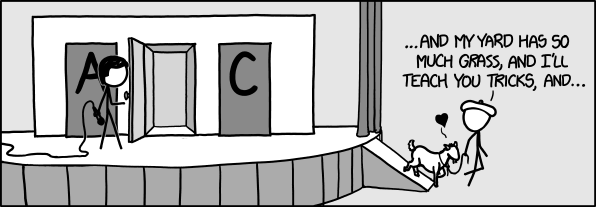@DwB
Your explanation would work if you chose your door AFTER you were shown a door that had a goat behind it.
Since you make your choice while there are 3 choices, the probability you choose the right door is 1/3 no matter if he shows you a goat or not.
If you choose one of the goats at first, you have a probability of 2/3 of choosing one of those right? So the beauty of this problem is that if you choose a goat first, and switch you will always get the car.
Think about it, if you choose one of the goats first, then the other goat will always get shown. If you switch then you will always switch to the car.
You want to choose a goat first to win this game by SWITCHING.(2/3)
You want to choose a car fiRst to win this game by NOT SWITCHING.(1/3)
4 doors...
You choose a car at first(1/4)
You choose a goat at first(3/4)
He opens 2 doors with a goat behind them, so your first choice and the last door is left.
If you chose the car first and switched now, you would lose.
If you chose any of the 3 goats initially, and now switched, you would win the car.
It just comes down to the fact you have a better chance of picking one of the goats initially, so assuming he shows all the other "bad choices" to you, it is better to switch your answer you chose originally.
The probabilities you win by switching your choice, assuming that Monty opens all the other doors accept for the original one you picked and one other one.
3 doors (2/3)
4 doors (3/4)
5 doors (4/5)
6 doors (5/6)
7 doors (6/7)
8 doors (7/8)
n doors [(n-1)/n] = 1 - 1/n
as n approaches infinity 1/n becomes 0, and the general probability = 1 - 0 = 1.
So if we were to play this game with an infinite amount of doors, and switch our choice, we would win 100% of the time!

